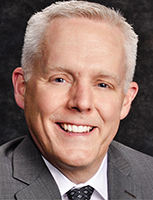
Profile: Matthew Utterback
His Leadership Lens Sees Equity
BY PAUL RIEDE/School Administrator, May 2017

|
| Matthew Utterback |
An African-American girl walked into then-Principal Matt Utterback’s office at Oregon’s Clackamas High School one morning and slapped three paperback books on his desk.
“Am I ever going to read a book in your school that isn’t written by a dead white guy?” she demanded. “In each of these books, my people are portrayed as the slave, the villain or the gangster. I’m none of those people.”
It was a jarring moment — but it was also the kind of exchange the principal wanted to encourage.
Utterback is now superintendent of the 17,000-student North Clackamas School District south of Portland. For nearly a decade, he has been focusing on issues of racial equity in his district. Part of that has been promoting frank conversations among administrators, teachers and students.
Utterback, superintendent of North Clackamas since 2012, is the recently named 2017 National Superintendent of the Year. At 49, he has worked in the same school district his entire 28-year career.
During his time there, he has helped the district emerge from a devastating recession, narrow the achievement gap, increase graduation rates and pass one of the biggest capital construction bonds in Oregon history.
Utterback’s equity push is perhaps his most distinctive achievement. He says he became passionate about the issue at a 2009 weeklong retreat of district staff. But it had been quietly gnawing at him well before that.
When he was 9, his parents adopted a 7-year-old boy from South Korea who arrived in Oregon unable to speak a word of English. The boy struggled mightily to adjust to an entirely new world while his family did its best to help him fit in.
Utterback says he realized that expecting his new brother to smoothly assimilate, without fully recognizing his Korean identity, was a mistake. He is applying that lesson in his schools, whose enrollment is about 70 percent white. Treating all students the same regardless of their backgrounds, he reasons, is not the same as treating them with equity.
“We were taught to be colorblind,” he says. “We were taught to treat everyone the same. We now know what an incredible disservice that is to our students.”
After that 2009 retreat, Utterback, as high school principal, convened monthly lunches with “affinity groups” of minority students where he listened to their experiences. As superintendent, he requires a weeklong equity retreat for all administrators and a two-day version for teachers. Back in the schools, the teachers form “equity cadres” to regularly discuss student diversity issues and adjust their teaching accordingly.
Utterback became principal of Clackamas High School as the recession began. Some 250 teachers were let go over three years. Average class size grew into the high 30s. Still, Utterback oversaw significant academic gains and a doubling of college-credit course enrollment.
As superintendent, he held hundreds of community meetings, developed a strategic plan and improved perceptions of the district.
The next step was to restore the infrastructure. After another exhaustive round of community meetings, residents last fall passed a $433 million capital construction bond with 63 percent of the vote.
Robin Troche, president of the North Clackamas Education Association, says that although Utterback was at every one of those meetings, he often did not take center stage.
“He’s a fairly unassuming person,” she says. “But if it’s going to be a meeting where there’s going to be slings and arrows, he’s going to be at the front of the room.”
Paul Riede is a journalism instructor at Cazenovia College in Cazenovia, N.Y. E-mail:
psriede@cazenovia.edu. Twitter:
@PaulRiede
BIO STATS: MATTHEW UTTERBACK
Currently: superintendent, North Clackamas School District, Milwaukie, Ore.
Previously: principal, Clackamas High School
Age: 49
Greatest influence on career: In 2009, following a weeklong retreat, I began to look at my own white racial identity through a lens of equity. I carry with me a responsibility and a moral obligation that a student’s gender, skin color, home language and parents’ income level cannot be a predictor of who graduates.
Best professional day: Any day I can talk to students about their education experiences, hopes and fears. These conversations make me a better leader.
Books at bedside: Excellence Through Equity by Alan Blankstein and Pedro Noguera and
Between the World and Me by Ta-Nehisi Coates
Biggest blooper: While attending a high school football game as a principal, I was knocked out cold in front of our cheering section when a football drilled me in the head.
Why I’m an AASA member: The opportunity to learn and grow from great leaders in the field.